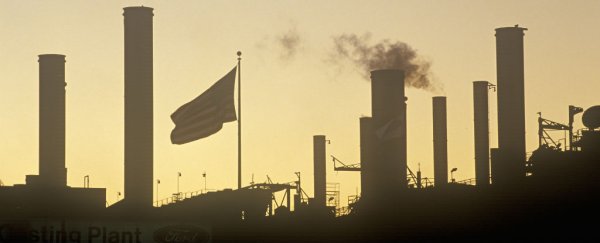In news that's equally shocking and not really shocking at all, Greenpeace has reported that when it posed as consultants for gas and oil companies and visited some of the top universities in the US, it caught two professors offering to write reports on the benefits of rising CO2 levels and the use of fossil fuels - for a price.
During discussions with disguised Greenpeace reps, the academics were happy to come up with ways to obscure the proposed corporate funding in their 'research', while admitting that the content likely wouldn't make it through the peer-review process, so they'd have to handpick the reviewers themselves.
As damning as that is, US secretary of state John Kerry played down the impact of the finding at the UN climate talks in Paris. "One professor or one scientist is not going to negate peer-reviewed scientists by the thousands over many years and 97 percent of the scientists on the planet," he told the press.
It's a perfectly reasonable thing to say, but the fact is that 30 percent of Americans are still not convinced that global climate change is real, and research published by 'skeptical' academics who may or may not be receiving money from fossil fuel companies is being cited as reasonable doubt.
The Greenpeace officials posed as consultants from a Middle Eastern oil and gas company and an Indonesian coal company and contacted professors from leading US universities asking if they could commission a report outlining the benefits of using fossil fuels, and of the increased levels of carbon dioxide in the atmosphere.
Two academics were happy to bite - known climate skeptic, William Happer, the Cyrus Fogg Brackett professor of physics at Princeton University; and Frank Clemente, a retired sociologist formerly employed by Pennsylvania State University.
"I could submit the article to a peer-reviewed journal, but that might greatly delay publication and might require such major changes in response to referees and to the journal editor that the article would no longer make the case that CO2 is a benefit, not a pollutant, as strongly as I would like, and presumably as strongly as your client would also like," Happer wrote in an email to what he thought was a fossil fuel rep, as Suzanne Goldenberg reports for The Guardian.
He suggested that he could pass his report on to handpicked reviewers instead. "Purists might object that the process did not qualify as a peer review. I think it would be fine to call it a peer review," he said.
Clemente, on the other hand, told who he thought was an Indonesian coal company representative that if he were to write a report challenging research linking coal use to increased rates of premature death around the world, he'd need about US$15,000 for an eight-to-10-page paper, and $6,000 for an opinion piece for a newspaper.
The Guardian reports that Clemente was fine with being quoted as a professor emeritus at Penn State - even though he's now retired and no longer employed by the institution - while at the same time declaring that he's an "independent scholar" and is not beholden to any university. He said he was under no obligation to reveal the source of his funding.
"Our research reveals that professors at prestigious universities can be sponsored by foreign fossil fuel companies to write reports that sow doubt about climate change and that this sponsorship will then be kept secret," John Sauven, the director of Greenpeace UK, told the press.
"Down the years, how many scientific reports that sowed public doubt on climate change were actually funded by oil, coal and gas companies? This investigation shows how they do it, now we need to know when and where they did it."
As we mentioned earlier, it's shocking to find confirmation that these academics are in the pockets of corporations that the vast majority of scientists agree are damaging the environment - quite possibly beyond repair - for profit. But it's also not surprising. We just have to make sure our children are educated enough in the actual science to make these kinds of tactics irrelevant in the future.
